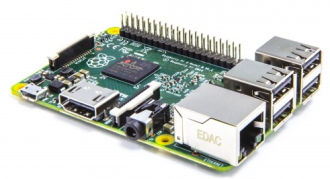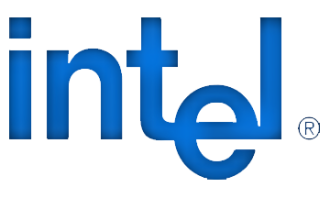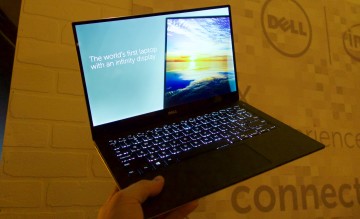 The people who make popular do-it-yourself circuit board said that they’ve released a new version of the device.
The people who make popular do-it-yourself circuit board said that they’ve released a new version of the device.
 The people who make popular do-it-yourself circuit board said that they’ve released a new version of the device.
The people who make popular do-it-yourself circuit board said that they’ve released a new version of the device.
 Data from market research company ABI Research indicates that Google’s Android operating system is losing share in the smartphone market.
Data from market research company ABI Research indicates that Google’s Android operating system is losing share in the smartphone market.
 Giant US microprocessor combine Intel has paid an unknown amount of money to snap up a Germany chip company.
Giant US microprocessor combine Intel has paid an unknown amount of money to snap up a Germany chip company.
 BT has surprised everyone by announcing that it is deploying next generation hybrid-fibre across the United Kingdom from 2016/17.
BT has surprised everyone by announcing that it is deploying next generation hybrid-fibre across the United Kingdom from 2016/17.
Dubbed G.fast broadband technology, it will provide “most homes” with speeds of ‘up to’ 500Mbps and there’s also a “premium” option for up to 1000Mbps.
At present most of BT’s national deployment is dominated by its hybrid Fibre-to-the-Cabinet (FTTC) broadband technology, which delivers download speeds of up to 80Mbps by running a fibre optic cable to your local street cabinet and then using VDSL2 over the remaining / existing copper line from the cabinet to your home.
This works for properties that exist up to 400 metres away from their street cabinet, although the service has been known to reach 2,000 metres at a slower speed.
G.fast is similar technology but it requires more radio spectrum and needs to run over much less than 250 metres of copper. As a result the high capacity fibre optic line has to be taken even closer to homes, usually as far as a smaller remote node that can be built on top of a telegraph pole, inside a street cabinet or underground.
This is expensive, although BT should not need to dig up your garden or run a new physical line into homes.
BT conducted a field trial of mock-up G.fast technology earlier this year and on the shortest 19 metre copper line it managed to achieve aggregated speeds of around 1000Mbps or 231Mbps upload and 786Mbps download. By comparison the “long” 66 metre line produced 200Mbps upload and 696Mbps download.
There will be two pilots which will start this summer in Huntingdon and Gosforth with 4,000 homes and businesses participating to see if the technology scales up.
BT will set up G.fast from different points of its network, with the pilots allowing it to assess various rollout options. It is also planning to develop a premium fibre broadband service for those residential and business customers who want even faster broadband, of up to 1Gbps.
 The British Army is setting up a psy-ops unit that will fight its battles on social media “in the information age”.
The British Army is setting up a psy-ops unit that will fight its battles on social media “in the information age”.
Head of the Army General Sir Nick Carter said the move was about trying to operate “smarter”.
Dubbed the 77th Brigade, the unit will be made up of reservists and regular troops and based in Hermitage, Berkshire.
Apparently, it has been inspired by the Chindits who fought in Burma in World War Two and seeks “new ways of allowing civilians with bespoke skills to serve alongside their military counterparts”.
Chindits was the name given to the Long Range Penetration (LRP) groups that operated in the Burmese jungle behind enemy lines, targeting Japanese communications.
The new unit will also use the old Chindit insignia of a Chinthe, a mythical Burmese creature which is half-lion and half-dragon.
The unit recognises that the actions of others in a modern battlefield can be affected in ways that are not necessarily violent and it draws heavily on important lessons from our commitments to operations in Afghanistan amongst others.
Recruitment for the brigade, 42 percent of whose personnel will be reservists, will begin this spring.
Its members will come from the Royal Navy and RAF as well as from the Army.
 Tin box shifter Dell is bringing the latest version of Ubuntu to its top-of-the-line Precision M3800 workstation laptop and the latest model of the Dell XPS 13 .
Tin box shifter Dell is bringing the latest version of Ubuntu to its top-of-the-line Precision M3800 workstation laptop and the latest model of the Dell XPS 13 .
Dell’s top-of-the-line Precision M3800 workstation laptop is available with Ubuntu Linux 14.04.
Dell’s Director of Developer Programmes Barton George wrote in his blog that programmers had been asking for a bigger, better officially supported Ubuntu Linux developer laptop.
The Precision M3800 came about from a combination of the efforts of Dell software engineer Jared Dominguez and enthusiastic user support.
George stated that the Ubuntu-powered Precision M3800 developer edition’s comes with preloaded Ubuntu 14.04 LTS, the next generation of the world’s thinnest and lightest true 15-inch mobile workstation a starting weight of 1.88kg and a form factor that is less than 0.71 inches thick
The lap top comes with a fourth generation Intel Core i7 quad-core processor, professional grade NVIDIA Quadro K1100M graphics, and up to 16GB of memory. It will have a 4K Ultra HD (3840×2160) screen option
The only thing that Dell could not shove under the machine’s bonnet was Thunderbolt 2 which could not be supported out of the box.
This was because Dell’s Ubuntu factory only ships Ubuntu LTS releases it could not ship with official Thunderbolt support.
“However, thanks to the hardware-enablement stack in Ubuntu, starting with upcoming Ubuntu 14.04.2, you will be able to upgrade your kernel to add some Thunderbolt support. We plan to be working with Canonical to re-certify the Precision M3800 with official Thunderbolt support,” he wrote.
It will be $50 less than the corresponding Windows configuration.
 Big Blue might be seeing its profits drop down the loo, but that has not stopped it paying bonuses to its top suits.
Big Blue might be seeing its profits drop down the loo, but that has not stopped it paying bonuses to its top suits.
IBM has brought back annual performance bonuses for its chief executive and her top lieutenants for 2014 despite falling profits and a tumbling stock price.
According to a regulatory filing, the outfit withheld annual bonuses in 2013 at the executives’ own request. The company has had more than 11 quarters of falling profits and is still trying to lose staff.
The bonuses returned as a feature of IBM’s executive compensation for 2014, according to a document filed with securities regulators on Friday, despite the fact that IBM’s net profit from continuing operations fell 7 percent last year and its stock shed about 14 percent.
IBM CEO Virginia Rometty will get a $3.6 million annual incentive payout for 2014, according to the filing. Chief Financial Officer Martin Schroeter and three other executives or advisers were also listed as getting smaller annual incentive payouts.
Rometty will receive a base salary of $1.6 million for 2015. This is her first rise in pay from the $1.5 million she got each of the last three years after taking up the post of CEO at the beginning of 2012.
She will also get a target annual incentive award of $5 million for 2015 and a long-term stock grant worth $13.3 million, which would be payable in 2018, according to the filing.
IBM last year withdrew its long-term plan to hit $20 per share in operating earnings for 2015 as it failed to get the sort of focus on higher-margin businesses such as security software and cloud services.
IBM has been divesting underperforming businesses in an attempt to move into the new era of cloud computing, a struggle shared by other established technology leaders.
No bonuses for the lesser suits, but at least they are not being fired.
 Companies relying on Big Data analytics might be disappointed to discover that they are not so good at finding a needle in a haystack after all.
Companies relying on Big Data analytics might be disappointed to discover that they are not so good at finding a needle in a haystack after all.
Currently the best way to sort large databases of unstructured text is to use a technique called Latent Dirichlet allocation (LDA) which is a modelling technique that identifies text within documents as belonging to a limited number of still-unknown topics.
According to analysis published in the American Physical Society’s journal Physical Review X, LDA had become one of the most common ways to accomplish the computationally difficult problem of classifying specific parts of human language automatically into a context-appropriate category.
According to Luis Amaral, a physicist whose specialty is the mathematical analysis of complex systems and who wrote the paper, LDA is inaccurate.
The team tested LDA-based analysis with repeated analyses of the same set of unstructured data – 23,000 scientific papers and 1.2 million Wikipedia articles written in several different languages.
Not only was LDA inaccurate, its analyses were inconsistent, returning the same results only 80 percent of the time even when using the same data and the same analytic configuration.
Amaral said that accuracy of 90 percent with 80 percent consistency sounds good, but the scores are “actually poor, since they are for an easy case.”
The base of data for which big data is often praised for its ability to manage – the results would be far less accurate and far less reproducible, according to the paper.
The team created an alternative method called TopicMapping, which first breaks words down into bases (treating “stars” and “star” as the same word), then eliminates conjunctions, pronouns and other “stop words” that modify the meaning but not the topic, using a standardized list.
This approach delivered results that were 92 percent accurate and 98 percent reproducible, though, according to the paper, it only moderately improved the likelihood that any given result would be accurate.
The paper’s point was that it was not important to replace LDA with TopicMapping, but to demonstrate that the topic-analysis method that has become one of the most commonly used in big data analysis is far less accurate and far less consistent than previously believed.
 The Information Commissioner’s Office (ICO) has made Google sign an undertaking to improve information about how it collects personal data in the UK.
The Information Commissioner’s Office (ICO) has made Google sign an undertaking to improve information about how it collects personal data in the UK.
 Scientists at the Massachusetts Institute of Technology (MIT) said just four pieces of vague information can open the door to crackers and hackers.
Scientists at the Massachusetts Institute of Technology (MIT) said just four pieces of vague information can open the door to crackers and hackers.
 A Bulgarian ethical hacker has found a hole in the firmware of DLink routers which make them vulnerable to remote changing of DNS settings and, effectively, traffic hijacking.
A Bulgarian ethical hacker has found a hole in the firmware of DLink routers which make them vulnerable to remote changing of DNS settings and, effectively, traffic hijacking.
Todor Donev, a member of the Ethical Hacker research team, says that the vulnerability is found in the ZynOS firmware of the device, D-Link’s DSL-2740R ADSL modem/wireless router.
The firmware is used in gear made by D-Link, TP-Link Technologies and ZTE.
The flaw allows attackers to access the device’s Web administration interface without authentication, and through it to modify the DNS settings, which could allow them to redirect users to malware-laden and phishing sites and prevent them to visit legitimate sites for OS and software updates (including security software).
Donev released exploit code for the flaw in a security advisory and said that it could be exploited remotely if the device’s interface is exposed to the Internet.
It is not the first time that the firmware has been found a little holey. In March 2014, Internet security research organization Team Cymru uncovered a global attack campaign that compromised over 300,000 home routers and changed their DNS settings. A different vulnerability in ZynOS was exploited in that attack and one of the techniques used was likely CSRF.
 Software supremo Microsoft is investing in a start-up that wants to give Google Android a good kicking.
Software supremo Microsoft is investing in a start-up that wants to give Google Android a good kicking.
Microsoft has written a cheque to power up Cyanogen, which is building a version of the Android mobile operating system outside of Google’s auspices.
Apparently Microsoft is a minority investor in a roughly $70 million round of equity financing and the financing round could grow with other strategic investors that have expressed interest.
All of them are keen that to help Cyanogen to diminish Google’s iron grip over Android.
Microsoft offers its own Windows Phone mobile operating system which should be doing its own thing to kill off Android. But Windows Phone has only about 3 per cent market share, which may be prompting Microsoft to consider unconventional steps.
Google has frustrated manufacturers in recent years by requiring them to feature Google apps and set Google search as the default for users, in exchange for access to the search engine, YouTube, or the millions of apps in its Play Store.
For Microsoft, that means less exposure for its Bing search engine, which is up against Google search. It also could limit growth of other Microsoft software products.
Cyanogen has a volunteer army of 9,000 software developers working on its own version of Android.
Kirt McMaster, Cyanogen’s chief said his company’s goal is to take Android away from Google.
It had raised $100 million to date. Previously the company had disclosed that it raised $30 million of funding.
Cyanogen recently signed a deal with Indian smartphone maker Micromax to ship handsets with Cyanogen’s software and is close to announcing more such deals, say people familiar with the matter.
 The cocaine nose jobs of Wall Street clutched the spaces where their hearts should be after the search engine Google announced that its revenue growth had been stalled by the strong US dollar.
The cocaine nose jobs of Wall Street clutched the spaces where their hearts should be after the search engine Google announced that its revenue growth had been stalled by the strong US dollar.
Google’s revenue grew 15 percent in the fourth quarter but fell short of Wall Street’s target thanks to declining online ad prices and unfavorable foreign exchange rates.
The outfit appears to be losing ground to Facebook on the advertising front. Facebook reported on Wednesday that mobile ads on its network doubled year-over-year during the fourth quarter.
Google said the “cost per click,” decreased 3 percent year-over-year in the fourth quarter, while the number of consumer clicks on its ads increased 14 percent.
Analysts had expected gains in cost-per-click and they are now saying that Google’s business is slowing and it is going to look worse as the dollar strengthens.
Consolidated revenue in the three months ended Dec. 31 totalled $18.10 billion, compared to $15.71 billion in the year-ago period. Wall Street expected revenue of $18.46 billon.
Chief Financial Officer Patrick Pichette said in a statement that revenue grew “despite strong currency headwinds”.
Net income rose to $4.76 billion from $3.38 billion a year earlier.
 The US FCC has redefined the minimum spec required to define a service as broadband.
The US FCC has redefined the minimum spec required to define a service as broadband.
As part of its 2015 Broadband Progress Report, the raised the minimum download speeds needed from 4Mbps to 25Mbps, and the minimum upload speed from 1Mbps to 3Mbps.
At the stroke of a pen it triples the number of US households without broadband access and means there should be some jolly cross people miffed that they bought something they thought was broadband but isn’t.
Currently, 6.3 percent of US households do not have access to broadband under the previous 4Mpbs/1Mbps threshold, while another 13.1 percent do not have access to broadband under the new 25Mbps downstream threshold.
FCC Commissioner Tom Wheeler was vehement in his support for the new broadband standard. “When 80 percent of Americans can access 25-3, that’s a standard. We have a problem that 20 percent cannot. We have a responsibility to that 20 percent.”
FCC Commissioner Mignon Clyburn said: “We are never satisfied with the status quo. We want better. We continue to push the limit, and that is notable when it comes to technology… as consumers adopt and demand more from their platforms and devices, the need for broadband will increase, requiring robust networks to be in place in order to keep up. What is crystal clear to me is that the broadband speeds of yesteryear are woefully inadequate today and beyond.”
However there is a push to make the minimum broadband standards far past the new 25Mbps download threshold, up to 100Mbps.
FCC Commissioner Jessica Rosenworcel thinks the new threshold should be 100Mbps.
However, that would anger the telcos and cable providers who currently call the shots on internet connections in the US. Many of them would prefer to see dial up defined as broadband. As it is changing the national broadband standards to 25Mbps down and 3Mbps up is a bold move for the FCC.
Companies like AT&T and Verizon, which employ DSL services to a notable number of their users and AT&T’s fastest DSL offerings only reach 6Mbps down, while Verizon’s DSL speeds top out at 15Mbps.
In a letter sent to the FCC last week, the National Cable & Telecommunications Association (NCTA) made known its objections to any changes to current broadband standards, stating that examples used by supporters of raising the broadband standards “dramatically exaggerate the amount of bandwidth needed by the typical broadband user.”
The NCTA told the FCC that 25Mbps down isn’t needed for 4K streaming and that users aren’t even interested in higher quality content yet and they will take what ever the suppliers will give them or else they will have to move somewhere else.
The US is currently ranked 25th in the world in broadband speeds, thanks mostly to the fact that the telcos have nearly monopolistic power in the US and politicians in their backpocket.